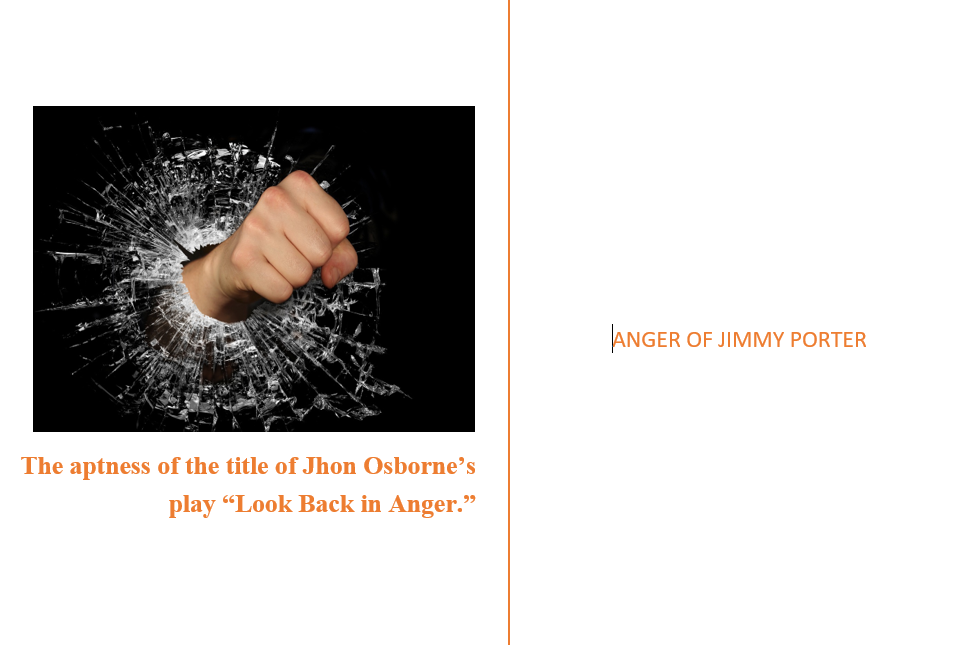
Discuss the appropriateness of the title of John Osborne’s play “Look Back in Anger.”
John Osborne’s play “Look Back in Anger” has a compelling title. It stimulates our interest in the theme of the play and predisposes us to think that anger is going to be its main theme. In fact, Osborne thought of as many as seven titles for the play, and out of them, six are variations on the theme of anger: ‘Farewell to Anger,’ ‘An Angry Man.’ ‘Man in a Rage.’ ‘Close the Case Behind You.’ ‘My Blood Is a Mile High,’ and ‘Look Back in Anger.’ It is because of the anger in the play, J.B. Priestley labeled him as ‘an angry young man.’ Jimmy Porter, the protagonist of the play serves as Osborne’s mouthpiece in denouncing the Church, the Royalty, the Conservative Government, the Upper-class and traditional morality. In ‘Look Back in Anger’, Osborne created what Hewison Called ‘the myth of the Angry Young Man.’
Jimmy’s anger is largely due to his working-class upbringing. He looks upon himself as a victim of class discrimination. He watched his father die without medical treatment. Because of his working-class identity, he could not get better employment despite his university education. His anger is the other name for helplessness. Jimmy himself explains: “You see, I learnt at an early age what it was to be angry-angry and helpless.” Aleks Sierz has described Jimmy’s anger as ‘emotionality’ and has pointed out that emotionality in “Look Back in Anger” is mainly expressed through Jimmy’s tirades. What is tragic about the tragi-comic play is that the men and women who are close to him become the targets of his verbal assault.
Jimmy is angry with the society he lives in. He looks upon himself as a working-class crusader in an ongoing class war against the so-called upper class represented by Alison and his in-laws. He makes gibes at his brother-in-law Nigel. Debunks and desecrates upper-class gatherings. Alison describes Jimmy’s invasion of her upper-class world as part of the class war. He is waging, with his wife as hostage. It is inevitable that his war will affect his private life. Katharine J. Worth remarks, “His irritation over the absurdities of the English class system does of course color his whole view of life and enters into the frustrations of his marriage.”
An intellectual, he is enraged by the lack of imaginative response he meets everywhere. He asks Alison and Cliff, “Did You read Priestley’s piece this week? Why on earth I ask, I don’t know. I know damned well you haven’t. Nobody reads except me.” Thus, what irks him most is the intellectual inertia for which he holds the upper class responsible. In spite of his pugnacity, Jimmy knows that this inertia is unassailable. He feels that this inertia, to Katharine J. Worth, “cuts right across class distinctions, affecting the common Cliff as much as the well-bred Alison.” Jimmy is angry that the people around him, unlike himself, are not moved by the sufferings of others. He laments, “Nobody can be bothered. No one can raise themselves out of their delicious sloth.”
Jimmy’s anger is revealed in his attitude to women and society. His savagery to Alison can be attributed, in the words of Faber “to Jimmy Porter’s unresolved Oedipus complex.” Jimmy wants a kind of cross between a mother and a Greek courtesan. Professor Huss remarks that Alison’s virginity at the time of marriage causes anger and feeling of defilement because she resembled more the sexually tabooed mother than the acceptable courtesan figure. His anger is expressed in whatever he does. He opens Alison’s drawers and reads her letters because the idea of respecting other people’s privacy is an essentially upper-class middle-class concept. Jimmy gives vent to his anger by defying the conventions of gentility and politeness. Osborne’s disillusionment with contemporary British society has been translated into Jimmy’s anger in “Look Back in Anger.”
——————————————————–
Work-cited
1. GALE, C. L. (2017). Study guide for John Osborne’s look back in anger. GALE STUDY GUIDES.
2. Sierz, A. (2008). John Osborne’s look back in anger (Continuum Modern Theatre Guides). Continuum International Publishing Group Ltd.